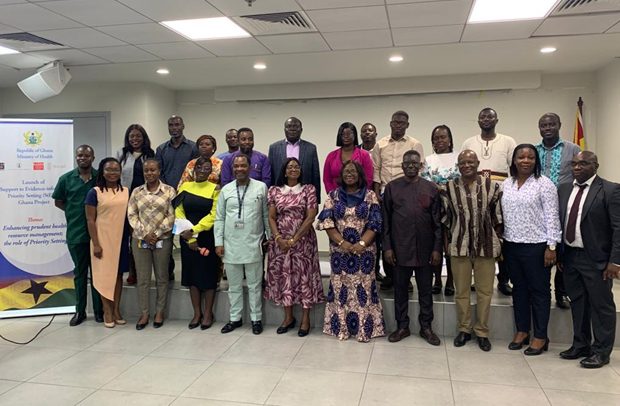Officials of various agencies after the launch of StEPS Project
The Ministry of Health (MoH) has launched a project to facilitate effective priority setting in order to improve efficiency, equity, and financial risk protection from essential Non-Communicable Diseases Intervention (NCDI) packages in Ghana.
The Support to Evidence-Informed Priority Setting (StEPS) Ghana Project launched in Accra will among other things define and propose an essential NCDI UHC package in Ghana.
It will also develop capacity in health economics and priority setting related to NCDI in Ghana and to make recommendations for integrated delivery of priority NCDI in the country’s health system.
The initiative, launched on the theme, ‘Enhancing prudent health resource management; the role of Priority Setting,’ is positioned to reshape the healthcare landscape and pave the way for a healthier future for the country.
Minister for Health, Kwaku Agyeman-Manu, in the speech read on his behalf said given the limited resources to support national health systems, there is need to ration these resources to achieve Universal Health Coverage (UHC), which is a key component of the Sustainable Development Goals (SDGs).
He said the escalating burden of NCDs transcends statistics as it deeply affects the lives of individuals, families and communities.
“Ghana, like many nations, grapples with the rise of cardiovascular diseases, diabetes, cancers, and chronic respiratory disorders. As we gather here to launch the project, we are sending a clear message of proactive response and unwavering determination to tackle NCDs head-on,” he added.
He thus emphasised that StEPS represents more than just a new initiative as it signifies the readiness to address NCDs using evidence-based strategies and effective priority-setting tools.
“Our goal is to navigate the complexities of NCDs, identify the most effective interventions and allocate resources judiciously,” he said.
Chair of the event, Dr. Martha Gyansa-Lutterodt, said the initiative is a crucial step toward reducing the burden of NCDs on the country’s healthcare system and society as a whole.
She added that the success of StEPS will be predicated on the power of collaboration and multi-stakeholder engagement.
“This would ensure a synergy of minds, expertise, and resources across various sectors. Healthcare professionals, policymakers, researchers, civil society organizations, and community leaders should rally under the banner of the project, underscoring our collective commitment to addressing NCDs holistically,” he said.
By Jamila Akweley Okertchiri

